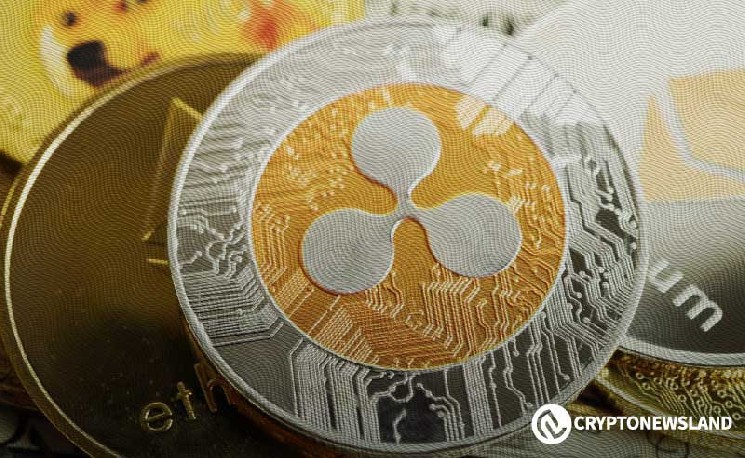Ripple Pre-IPO Valuation Sparks Debate Among XRP Investors

- Ripple’s CTO, David Schwartz, concerned about the transparency of synthetic pre-IPO shares.
- Ripple’s anticipated IPO valuation reaches discussions around $30 billion.
- Secondary market for Ripple shares grows despite investor warnings on risks.
The XRP community remains attentive to Ripple’s steps to become a publicly traded company. As discussions circulate about reaching $30 billion, pre-IPO shares in secondary markets have attracted controversies among investors and stirred several questions concerning their legitimacy and associated risks.
Synthetic Pre-IPO Stocks Raise Legitimacy Concerns
Synthetic pre-IPO stocks by third parties allow retail investors to get early exposure to Ripple before the public listing. Such products have received attention from the public and the community as they are presented as a means of more easily engaging in early-stage opportunities.
These markets are primarily concerning because they cannot provide adequate information and supervision. The skeptics’ major concern is that such shares float in a speculative market, putting investors at high risk. Compared to traditional securities such as float shares, synthetic shares do not have a direct link with Ripple’s offer and are more inclined to artificially inflated pricing and malpractice. This has led many within the XRP community to question such securities’ legal and moral acceptance.
Ripple CTO David Schwartz Highlights Investment Risks
Ripple’s Chief Technology Officer and co-founder, David Schwartz, recently commented on the matter. In a social media post, he warned those seeking investments in pre-IPO shares bought through secondary markets. Schwartz further pointed out that brokers do not give full and accurate information to retail investors, which puts the buyers at a disadvantage.
A huge problem with buying shares on secondary markets is everyone else (the seller, the broker) wants you to pay as high a price as possible and you are generally not entitled to any real disclosures.
I strongly suggest anyone thinking of buying shares on secondary markets, at…
— David “JoelKatz” Schwartz (@JoelKatz) December 14, 2024
Schwartz argues that brokers and middlemen focus on earning the highest fees from sellers while providing minimal information to buyers, the ordinary investors. He recommends that those involved in secondary market transactions use information from other sources besides brokers. As Schwartz points out, some tools can offer insight into these markets, but their efficiency is strongly related to the quality of available data.
Caution Urged as Ripple’s Public Listing Nears
Analysts have predicted that with Ripple’s official public offering around the corner, demand for pre-IPO shares will likely increase. Still, Schwartz’s comments remind investors to proceed cautiously on such prospects. Using insufficient or skewed information results in overreliance and potential insecurity, especially within a fairly saturated market.
Entrepreneurs are advised to research and authenticate any fact from a reliable source. Reading multiple quotes and knowing the risks of secondary market transactions can help avoid traps. Even though the interest in investing at the angel and seed rounds appears undeniably tempting, practicing proper due diligence in the context of highly risky investments is of great value.



 Bitcoin
Bitcoin  Ethereum
Ethereum  Tether
Tether  Dogecoin
Dogecoin  USDC
USDC  Cardano
Cardano  TRON
TRON  Chainlink
Chainlink  Stellar
Stellar  Hedera
Hedera  LEO Token
LEO Token  Bitcoin Cash
Bitcoin Cash  Litecoin
Litecoin  Cronos
Cronos  Ethereum Classic
Ethereum Classic  Monero
Monero  Dai
Dai  Algorand
Algorand  OKB
OKB  Cosmos Hub
Cosmos Hub  Stacks
Stacks  Theta Network
Theta Network  Gate
Gate  Maker
Maker  KuCoin
KuCoin  Tezos
Tezos  IOTA
IOTA  NEO
NEO  Zcash
Zcash  Polygon
Polygon  Synthetix Network
Synthetix Network  Tether Gold
Tether Gold  TrueUSD
TrueUSD  Dash
Dash  Holo
Holo  Zilliqa
Zilliqa  Enjin Coin
Enjin Coin  0x Protocol
0x Protocol  Basic Attention
Basic Attention  Qtum
Qtum  Siacoin
Siacoin  Ravencoin
Ravencoin  Bitcoin Gold
Bitcoin Gold  Decred
Decred  NEM
NEM  DigiByte
DigiByte  Ontology
Ontology  Nano
Nano  Status
Status  Huobi
Huobi  Waves
Waves  Hive
Hive  Lisk
Lisk  Numeraire
Numeraire  Steem
Steem  Pax Dollar
Pax Dollar  BUSD
BUSD  OMG Network
OMG Network  Ren
Ren  Bitcoin Diamond
Bitcoin Diamond  Bytom
Bytom